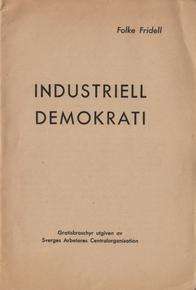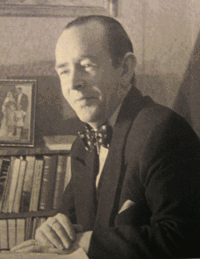Folke Fridell
Folke Ivar Valter Fridell (1 October 1904 – 12 August 1985) was a Swedish writer of the proletarian school and syndicalist.
Biography
Fridell was born the youngest of a large family (6 siblings, and 6 more half siblings by his father) living in a stream-side home in a woods in Lagan, Kronoberg County, Småland, in Götaland, Sweden. That part of Sweden consists of forested lakes and bogs, out of which arable patches had been carved. In the late 18th through early 19th centuries, the region had hemorrhaged emigrants to Minnesota. Fridell's mother was a public school teacher and seamstress and his father was a soldier, tailor, and postal carrier. The family was locally known for their intense reading culture, and Fridell's education mostly came through that family culture, the local library, and a book collection he found in a deserted house while he was shepherding. At age 13, he started working in a textile factory, and after a youthful spell of learning the masculine arts of card-playing, drinking, fighting, and generally being a roughneck, at age 19 he was shocked straight by his older brother's drowning. Thereafter he returned to reading, and in addition took up writing after factory work hours. Fridell married Hanna "Stina" Wahlberg (9 years his junior) in 1934, and together they raised two boys, born 17 years apart. He would remain at the factory until 1946, when he was able to quit and support himself on his writing.[1]
Despite his brief hard-living stint, at a young age, Fridell joined the IOGT, the Temperance movement. In 1921, the year of his brother's death, he participated in the formation of and was made secretary of a local branch of the Central Organisation of the Workers of Sweden (Sveriges arbetares centralorganisation, SAC). In meetings, he was at first shy about the organization material he wrote. When the Syndicalist Workers' Federation (Syndikalistiska arbetarefederationen, SAF) broke from SAC in 1929, Fridell followed, as he admired the more radical politics of the founder, a Swede who had spent some years working and living in the U.S. Fridell became a member of SAC once again when SAF merged back into SAC in 1938.[2]
In the 1930s, Fridell started writing for Arbetare-Kuriren, the newspaper of SAF. After the reunion of SAC and SAF in 1938, he contributed frequently to Arbetaren, SAC's newspaper. Fridell is recognized as a theorist of syndicalism.[3] He was also active as a lecturer and a delegate at several SAC congresses; from 1942 until 1946, he was a deputy in the organisation's central committee. Swedish Syndicalist archives include posters prominently advertising Fridell as the featured speaker at May Day demonstrations inviting "All peace- and freedom-loving people together."[2]

Fridell debuted as a fiction writer with the novel Tack för mig – grottekvarn ("Thanks from me, treadmill") in 1945, and his breakthrough came with his second novel, the strongly autobiographical Död mans hand (1946). He was hooked and wrote a book nearly every year thereafter, winning labor and national awards for his writing every decade of his life after 1950. Although they were savagely denounced and dismissed by conservatives, his novels were widely read, in part thanks to their distribution by book ombudsmen in the factories.
Fridell explained the reason behind his art: "As long as there are proletarians, there is a proletarian literature. And I would like to go a little further and say that as long as people are insulted in their work for so long, there must be voices that speak their language and take their case."
By his influential criticism of monotonous and soul-killing factory work in Sweden's modernizing era of Taylorist automation, Fridell become a renewer of the workplace as well as a champion of the right of the worker to defend his dignity and capacity for cooperative decision-making. Other frequent themes of Fridell's writing were juvenile delinquency, rural flight and dystopian views of the future.[2]
Fridell's work has been regarded as easy to read, conveying an ironic sense of humor. A prolific writer and editorialist, he often wrote in the voice of an alter ego.[2] His play "One Man's Bread" was translated into English; the working class characters' dialogue was represented in British cockney accents. Fridell's novel Rikedom ("Wealth," 1956) was made into a television film in 1978.[4] In 2005 Swedish singer-songwriter (and orienteering expert) Erik de Vahl released a mellow song he composed and named after Fridell.
The following excerpt from his novel Tack för mig – grottekvarn demonstrates Fridell's anarchist, but also very Swedish critique of the suffocating, crushing experience of intimate betrayal, excessively imposed upon workers as unfreedom cascades like a net from the controlling interest of the capitalist (concentrated wealth accumulation):
"Imagine if I went to the employer tomorrow and said, 'I do not want to work today. I will snatch pike from the brook and laze me in the grassland, for I am a free person.' What do you think he would say? He would say I was mad, that I should be investigated or detained at a forced labor agency.
I judge his judgment because he is a party to the matter and he loses financially if I celebrate but one day. But that's not the worst.
Worse it is that everyone else becomes his avatar. My companions would say, 'Now Oskarsson has gone crazy again.' And in the barracks all the fools would huddle in the stairwells and pitch pointed words at my old lady, and the kids would ask my kids how it was with crazy Oskarsson! And the end of the whole thing would be my own wife crying, begging me to relent and, for her and the children's sake, to get back to work posthaste."
The dialogue suggests the character is struggling with the pain of betrayal, as he partially feminizes that traitorous net of inegalitarian social control. That associative feminization could work as a distraction from the inegalitarian distribution of sovereign agency that, Fridell also recognizes, directs that refracted, enveloping, and penetrating coercive power. Yet Fridell’s analysis, expressed in his creative work, does not point to human social interdependence—or even non-sovereign, delegated agency—as the root of unfreedom. Rather, the cause of unfreedom is the inegalitarian institution of ownership and control–as it dominates, enslaves, and turns against us our own human social interdependence.
In capitalism, we are compelled to betray one another, and our own needs, usually for nothing other than the thoughtless maximization of elites’ relentless accumulation of wealth and rivalry with each other. In this way, our torturous social- and self-dissolution, our unmaking, is automated. That is one devastating price of absolute private property right and absolute elite liberty.

Conversely within this framework, heroism, which is not automated, consists in collectively devising and implementing interventions–deprioritizing capitalist and other rentier interests in control, exploitation, and appropriation–by which working people can regularly allow each other and themselves reasonable freedoms. Apart from fleeting, idiosyncratic moments of grace, heroic interventions cannot be uncontested, painless, or bloodless. But they restore to us our captured social network and ourselves. They restore to us our social human capacity to relieve our mortal, sentient suffering.
Fridell died in 1985 at the age of 80 and is buried in the cemetery of Berga church in Lagan.[5] Outside the library in Ljungby, a bronze bust of Folke Fridell commemorates his contributions to the development of literature, theory, working conditions, and human liberty in Sweden.
References
- "Folke Fridell: Textile Mill Worker, Anarcho-syndicalist, Proletarian Writer". libcom.org. Retrieved 27 June 2018.
- "Fridell, Folke 1904-1985 / Biografier / Historik / Om SAC / Hem - SAC Syndikalisterna". www.sac.se.
- "Fridell, Folke 1904-1985" (in Swahili). Sac.se. 21 September 1921. Retrieved 28 September 2019.
- "Rikedom (1978)". web.archive.org. 22 March 2016. Archived from the original on 22 March 2016.
- "Fridell, Folke 1904–1985". SAC-Syndikalisterna. Retrieved 26 June 2018.
External links
Swedish-language biographies and studies on Folke Fridell and his work can be found at the SAC-Syndikalisterna Biografiskt om Folke Fridell website.
A sampling of Fridell's (Swedish language) political writings are archived at the Wayback Machine website, Att vara med och dela och bestämma (2013).